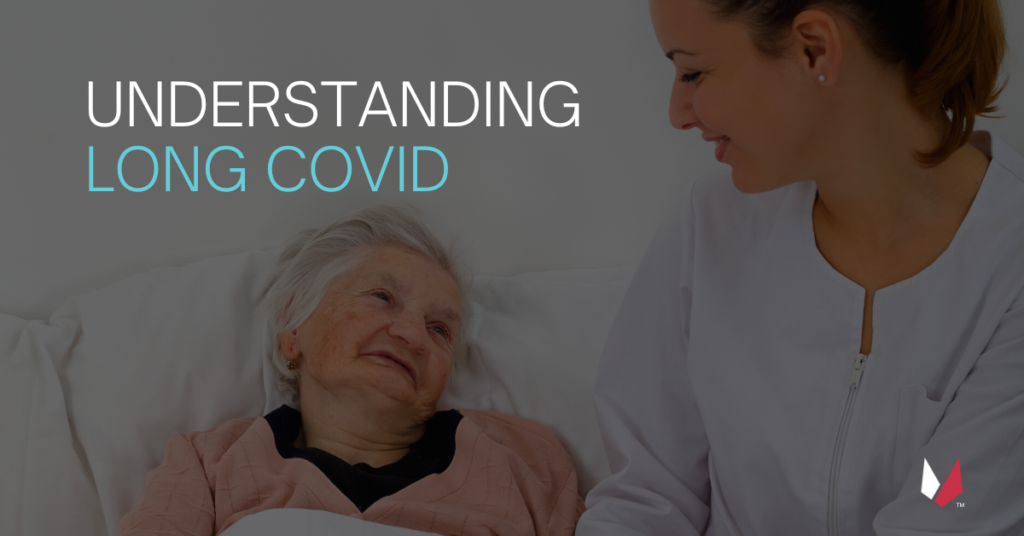Long Covid: A New Factor in Home Care

Long Covid (Post-COVID-19) involves a variety of ongoing symptoms that people experience more than four weeks after getting COVID. In some cases, these symptoms can last months or years or cause permanent damage.
Research suggests that between one month and one year after having COVID, one in five people ages 18 to 64 has at least one medical condition that might be due to COVID. Among people aged 65 and older, one in four has at least one medical condition that might be due to COVID.
Older adults are more likely to have persistent symptoms such as fatigue, breathlessness, muscle aches, heart palpitations, headaches, joint pain, and memory and concentration difficulties.
Home care agencies should be aware of the potential effects of Long COVID. New conditions should not be automatically related to aging. Encourage your caregivers to report any new or returning symptoms to their supervisor so the family can get proper medical care. You may need a new or updated care plan that includes instructions from the family or physician. Failing to do so means the client might not receive appropriate care.
According to John Hopkins, long COVID does not affect only those who had a severe case of COVID but can happen in people who had mild symptoms as well. However, research suggests that patients with more severe initial illness seem more likely to have long-term damage.
Researchers at John Hopkins state that a severe case of COVID can produce scarring and other permanent lung problems. Still, even mild infections can cause persistent shortness of breath — getting winded easily even after light exertion. In addition, experts say it can take months for a person’s lung function to return to pre-COVID levels.
There has been some connection between heart problems and COVID. In fact, one study showed that 60% of people who recovered from COVID-19 had signs of ongoing heart inflammation, which could lead to the common symptoms of shortness of breath, palpitations, and rapid heartbeat. Moreover, this inflammation appeared even in those who had had a mild case of COVID and had no medical issues before they got sick.
In a recent article by John Hopkins, Neurologist Arun Venkatesan, M.D., Ph.D., said, “Some individuals develop medium to long-term symptoms following COVID infection, including brain fog, fatigue, headaches, and dizziness. The cause of these symptoms is unclear but is an active area of investigation.”
COVID-somnia” is also an increasingly common complaint among those who have had COVID. This can also be caused by a more serious illness, so it is essential a doctor rule out other problems, such as cardiac issues or lung disease. COVID-somnia is a difficult symptom to recognize. According to the Sleep Foundation, people aged 60 and older are more susceptible to insomnia, which can be attributed to several factors. Seniors are at higher risk of medical and psychiatric conditions that can lead to insomnia symptoms and other sleep disorders such as sleep-disordered breathing or restless legs syndrome. A person’s internal circadian clock and sleep-wake cycles can also change as a person ages, and these changes affect how long – and how well – a person will sleep. Additionally, certain medications that alleviate symptoms of geriatric medical conditions can cause sleep disturbances. If there is a change in a client’s sleep pattern, the family should be aware, so they can seek professional help to determine the root cause.
Research in hospitals and universities continues around Long COVID and its long-term effects. More than 80 medical centers in more than 30 states are enrolling patients in a four-year, $1.15 billion study of long covid that is funded by the National Institutes of Health, known as RECOVER (Researching COVID to Enhance Recovery).
The neurological effects of Long COVID can cause a home care client to process things differently, be delayed in responding, or struggle with simple tasks. Isolation and fear of COVID can also lead to increased anxiety and depression. Caregivers should not overlook any change or dismiss it as part of aging.
COVID changed our world, and it seems to be here to stay in some form or another. Taking precautions to avoid spreading COVID is just the beginning of protecting your clients. We have now moved into another phase of COVID which comes long after the onset. Agencies should add Long COVID training to ongoing staff education. Understanding Long COVID, the potential symptoms, and who to contact will provide a better client experience and early intervention with health issues.
Sources:
Mayoclinic.org, https://www.mayoclinic.org/diseases-conditions/coronavirus/in-depth/coronavirus-long-term-effects/art-20490351
John Hopkins Medicine. Long COVID: Long-Term Effects of COVID-19, June 14, 2022
Sleep Foundation, https://www.sleepfoundation.org/insomnia/older-adults
